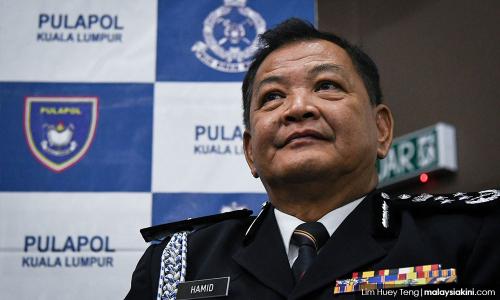Welcoming the IGP's assurances on the IPCMC
LETTER | The Society for the Promotion of Human Rights (Proham) welcomes the assurance from the newly appointed Inspector-General of Police Abdul Hamid Bador that the Independent Police Complaints and Misconduct Commission (IPCMC) will serve both “the men in blue and the man on the street.”
The IGP is on point when he says that he will support efforts to improve the image of the police, their welfare and effectiveness while at the same time ensuring that the public feels protected by the police.
Proham, besides consisting of former Suhakam commissioners, is also made up made up of former commissioners of the Royal Commission on the Malaysian Police, 2004-2005.
We have repeatedly said that the most important recommendation among the 125 recommendations from the Royal Commission Report in 2005 is the setting up of an IPCMC to not only restore public confidence in policing, but ensure police accountability as a system of internal and external checks and balances.
There has been resistance that the proposed IPCMC will not only have investigation powers but issue disciplinary measures and recommendations if the investigations reveal misconduct, abuse of power and/or corruption.
There is no argument here, the IPCMC must have both investigation and disciplinary powers, otherwise it will be a toothless commission.
There is even some confusion that these investigation and disciplinary powers vested on the proposed IPCMC will be unconstitutional. This is wholly untrue because Article 140 (1) and 144 (1) of the Federal Constitution does allow for the formation of an independent service commission with disciplinary powers.
Furthermore, although the first draft bill of 2005 by the Royal Commission did provide that the IPCMC will have the last word on discipline.
The Bar Council has since amended the bill to ensure that the process is fair. The individual police officer accused of misbehaving has a right to be heard and defend himself or herself, and that any finding and order by the IPCMC can be subject to a judicial review.
Proham would like to offer its expertise and commitment to work with the Home Ministry to ensure that the proposed IPCMC is effective and observe the following principles, such as that the composition of the IPCMC may not be drawn from retired or serving police offices.
The powers of the IPCMC must include receiving complaints from the public regarding alleged police misconduct, to decide whether to investigate a complaint on its own or with other agencies and initiate an investigation on its own even without receipt of a complaint.
The IPCMC shall have the power to summon witnesses and hear sworn testimony, the power to enter and inspect any premises occupied or used by a public body or statutory authority.
A key operating principle is to conduct investigation promptly and expeditiously in order to maintain confidence in the rule of law.
Malaysia is poised at this juncture to fully embrace and implement its reform agenda, it is a show of courage and maturity for our police force to subject itself to transparency, accountability, independent scrutiny and oversight.
IVY JOSIAH is the secretary-general and KUTHUBUL ZAMAN BUKHARI is the chairperson of the Society for the Promotion of Human Rights (Proham).
The views expressed here are those of the author/contributor and do not necessarily represent the views of Malaysiakini.
RM12.50 / month
- Unlimited access to award-winning journalism
- Comment and share your opinions on all our articles
- Gift interesting stories to your friends
- Tax deductable
